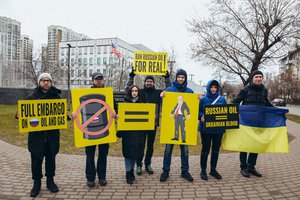Evidence is mounting that the price cap isn’t working, say Ukrainian & climate groups
One year on from Russia’s illegal full-scale invasion of Ukraine, the price cap on Russian oil isn’t working. Governments should scrap the cap and institute a ban on the trade of Russian oil.
The price cap is supposed to prohibit Western companies from enabling the trade of Russian crude, unless purchased for less than $60 a barrel. But evidence is mounting that the price cap, already far above Russia’s production costs, is having a limited impact on the trade of Russian oil.
The price cap of $60 was announced in December 2022. Now, commercially available data shows that in the Far East, Western companies are trading Russian oil which is selling above the price cap level. And multiple reports cite Chinese & Indian customs data suggesting that local importers bought Russian crude without a discount, at a similar price to Brent. The cap is proving little more than a G7-approved press release.
Worse still, the price cap enforcement system relies on attestations, what amounts to an honour system, in the form of promises from the fossil fuel industry that officials may occasionally check. There has been no evidence of relevant authorities in any price cap country enforcing any penalties for violations. As a result, it’s unlikely that any trades have taken place beneath the price cap which would otherwise have taken place above it.
This system is contributing to record Russian exports. January 2023 was Russia’s strongest month for oil exports since 2019. These exports, which Western companies continue to facilitate, are fuelling the war in Ukraine and delaying the energy transition.
The U.S. has argued that maintaining the global supply of oil is essential, and that efforts to reduce Russia’s exports would result in higher prices and therefore even higher revenues for the Kremlin. But that ignores the control OPEC+ countries have over global oil prices. This factor will remain a constant with or without a price cap on Russian oil.
If the price cap was enforceable, lower prices for producers might disincentivise oil production. But the increased incentive for consumers to use that cheaper oil would cancel out those climate benefits, and in practice the price cap has had no observable impact on Russian oil prices. Its only measurable impact has been to reduce restrictions on the global supply of Russian oil. That’s bad for Ukraine, and bad for the climate.
Simple, enforceable, and well-enforced rules can have impact. The import bans on Russian oil and coal have reduced Russia’s revenues, by reducing demand. But the price cap is enabling Russian oil flows that we might otherwise be able to prevent.
Russia’s fossil fuels embody existential threats to Ukraine, to democracy, and to the planet. The opportunity to keep them in the ground, to accelerate the energy transition and to gut Russia’s ability to wage war is not one we can afford to pass up.
Signatories
- Razom We Stand – Ukraine
- Global Witness – United Kingdom
- Center for Environmental Initiatives "Ecoaction" – Ukraine
- Fridays For Future Ukraine
- Urgewald - Germany
- Ecoclub Rivne – Ukraine
- Clean Air Action Group – Hungary
- VCS Verkehrs Club der Schweiz – Switzerland
- Warszawski Alarm Smogowy – Poland
- Transform Scotland – United Kingdom
- RePlanet - United Kingdom
- Unique Planet – Ukraine
- Center for Biological Diversity – United States
- Fundacja Promocji Pojazdów Elektrycznych - Poland
- Friends of the Earth Norway
- 350.org

Ukrainian activists at the US Embassy in Kyiv